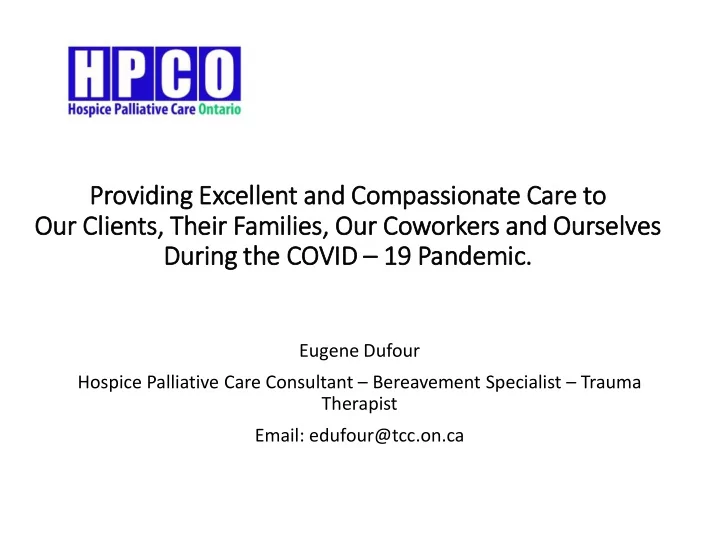

Provi vidin ing Excell llent and Co Compassio ionate Ca Care to Our r Clie Clients, Th Their ir Famil ilie ies, Our r Co Cowork rkers and Ourselv lves Durin ing the COVID – 19 Pandemic ic. Eugene Dufour Hospice Palliative Care Consultant – Bereavement Specialist – Trauma Therapist Email: edufour@tcc.on.ca
Rachel Dragas Welcome and Introduction
Se Sess ssio ion One: : Preparin ing ourse selv lves for r the marathon of a ic . Pandemic - Crisis Management 101 - What is “Pre -Post Traumatic Stress - Identifying “Pre - Post Traumatic Stress” Symptoms - Self Care for the pandemic marathon. - Explanation of the Compassion Fatigue Test
Focus of f th the Webinar Focus One : Provide the Health Care Worker an opportunity to debrief and defuse from the suffering that you have been experiencing. The webinars will help you identify “Pre -Post Traumatic Symptoms and helpful ways of coping with these reactions to long term suffering. Focus Two: Provide the Health Care Worker with added skills on how to support our clients, family members and our coworkers during this time of multiple and complicated losses. 4
Crisis Management 101 Five Basic Skills No matter the situation, crises are a part of life and it is important that we have the following skills to properly deal with the situation. 1. Communication. 2. Adaptability 3. Self-Control 4. Relationships 5. Creativity 5
Two Parts of f Crisis Management 1. . Tactical 2. . St Strategic 6
Hyper Arousal Will Be Our Biggest Enemy Hyper Arousal – sets off – Chemical Reaction – engages – Fight, Flight or Freeze 4 X 4 Breathing Technique to stay out of the fight or flight response. This is the technique: Step One : Take a breath in through your nose to the count of four. Step Two : Hold that breath for the count of four. Step Three : Breath out through your mouth to the count of four. Step Four : At the end of breathing out, hold your breath to the count of four. 7
Pre-Post Traumatic St Stress Symptoms When First Responders return home from a difficult shift, their partners are trained to ask one question: What do you need to do first: - Eat - Sleep - Talk P.S. The question is not optional. 8
For those working directly with People Suffering from COVID – 19: - Keep talking to your team. Make talking your self medication tool. - It is normal to have fears about the virus – give those fears a voice. - If a “shake – rattle and roll body reaction” comes on…don’t stop it…..let it come. - We must share our vulnerability – which in turns makes us stronger. - Knowledge is power which breaks down fear. - This is going to be a marathon – talking will be our power drink. - Having a darn good cry is healthy – let it come. - Rely on us old farts……we might be to high risk to do front line work, but we can support you. 9
When a person is is goin ing off sh shift ift sa say to them: 1. . What was most t dif iffi ficult lt about your r sh shif ift? 2. . Is Is th there anyt ythin ing I I can do to make th thin ings easie ier? 3. . Th Thank you for r bein ing here today. 10
Emotional and Spiritual care is to devote presence, attention, and respectful assistance to helping people to discern what is the meaning in their life now, in this new environment of pain; and how they seek to live out that meaning as the recovery unfolds. 11
“Everyone is a house with four rooms, a physical, a mental, an emotional and a spiritual. Most of us tend to live in one room most of the time, but unless we go into every room, every day, even if only to keep it aired, we are not a complete person.” – Indian Proverb 12
I In In cris isis care we li live wit ith the paradox of knowing that I I am at the same tim ime part of f a great wound and part of f a great healing 13
We in the care partnering communities frequently encounter people with life threatening illness at a point when they are no longer who they have been and are not yet reborn into who they will be. We meet them in a place between “no longer” and “not yet” Joan Borysenko 14
Evaluations 1. Did you find this session helpful? ( Single Choice) 2. Was the length of the session sufficient? ( Single Choice) 3. Was the format of the session appropriate? ( Single Choice) 4. Are you likely to implement any of the tools or concepts discussed in your daily life? ( Single Choice) 5. Did you have any technical difficulties participating in the webinar? ( Single Choice) 15
Resources Public facing resources: ontariocaregiver.ca/find- support/ 16
Contact Co Ra Rachel l Dragaš Project Lead, Person Centred Decision Making Initiative 416.304.1477 ext. 32 Email: rachel.dragas@hpco.ca Ri Richard Ng Nguyen Education Coordinator 416-304-1477 ext. 33 Email: richard.nguyen@hpco.ca Hosp spic ice P Pall llia iativ ive Ca Care Ontario io 2 Carlton Street, Suite 808 Toronto, ON M5B 1J3 www.hpco.ca 17
Recommend
More recommend